
58.6K
Downloads
208
Episodes
Maghrib in Past & Present | Podcasts is a forum in which artists, writers, and scholars from North Africa, the United States, and beyond can present their ongoing and innovative research on and in the Maghrib. The podcasts are based on lectures, live performances, book talks, and interviews across the region. Aiming to project the scientific and cultural dynamism of research in and on North Africa into the classroom, we too hope to reach a wider audience across the globe.
Episodes

Thursday Jul 27, 2023
Performing Place-based Knowledge: The Case of Aouchem
Thursday Jul 27, 2023
Thursday Jul 27, 2023
Episode 166: Performing Place-based Knowledge: The Case of Aouche
This podcast offers a contextual analysis of the exhibition histories and critical reception of the Algerian artist collective Aouchem. It will focus on the historical and political context that shaped Aouchem's work and how their democratizing ethos and aesthetic sensibility, rooted in Indigenous visual forms, influenced the decolonizing aesthetics of 1960s Algeria. The talk draws on contemporary Indigenous methodologies to offer a critical and theoretically informed analysis of Aouchem’s work, situating it within broader debates around Indigenous knowledge, place-making, and politics of space. The central theme of this presentation is to rethink land not as an object, but as a conduit of knowledge. Using primary sources such as published interviews with the artists and their own writings, as well as exhibition catalogues, the presentation theorizes Aouchem’s work as a performance of place-based knowledge.
Sheyda Aisha Khaymaz is an artist, curator, poet, and PhD candidate in Art History at The University of Texas at Austin, specializing in the modern and contemporary art of the Maghrib. Their doctoral dissertation, titled “Indigenous Presentness: Translocal Politics of Amazigh Art and Resistance,” focuses on the manifold expressions of indigeneity in art and explores the nexus between Amazigh artistic production and sovereignty movements across Tamazgha—the ancestral name for the lands of Amazigh peoples. The project theorizes the new artistic forms that emerged in the region after the 1960s, especially script-based abstract painting, which draw upon ancient sign-making practices, such as tattooing and rock-engraving, as decolonial phenomena. Khaymaz’s research aims to connect modern-day instances of Tamazight language activism and Indigenous revival movements with a larger discourse on indigeneity and Africanity. Khaymaz is the 2023 recipient of the Rhonda A. Saad Prize for Best Paper in Modern and Contemporary Arab Art, awarded by the Association for Modern and Contemporary Art of the Arab World, Iran, and Turkey (AMCA), and the 2022 Mark Tessler Graduate Student Prize Award, awarded by the American Institute for Maghrib Studies (AIMS). Their writing appears in the Journal of Black Studies, the E3W Review of Books, and various exhibition catalogues.
This episode is part of the “Modern Art in the Maghrib” lecture series and was recorded on the 27th of April, 2023 by the Centre d'Études Maghrébines à Tunis (CEMAT).
To see related slides, visit our website www.themaghribpodcast.com
We thank our friend Mohamed Boukhoudmi for his interpretation of the extract of "Nouba Dziriya" by Dr. Noureddine Saoudi for the introduction and conclusion of this podcast.
Posted by Hayet Lansari, Librarian, Outreach Coordinator, Content Curator (CEMA).

No comments yet. Be the first to say something!